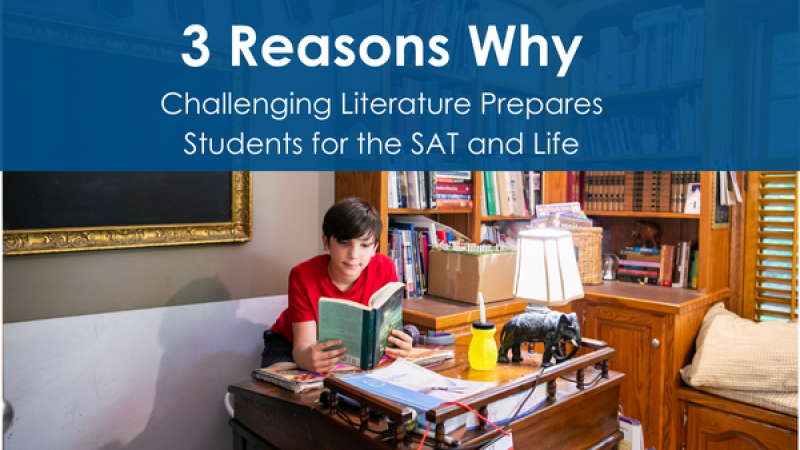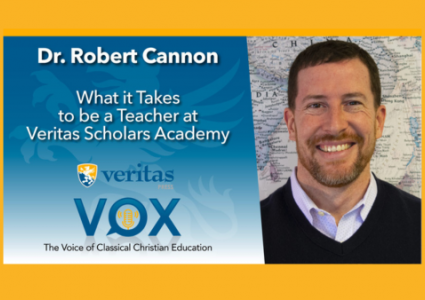Three Reasons Why Challenging Literature Prepares Students for the SAT and Life

Three Reasons Why Challenging Literature Prepares Students for the SAT and Life
I workout…sometimes. Working out sometimes does not have the same benefits for health and “buffness” as working out regularly, thoughtfully, and consistently yields. Some professional athletes watch what they eat obsessively, work out like maniacs, and even sleep in oxygen-depleting environments that used to look like giant Tylenol capsules so that their bodies can work harder with less oxygen while they sleep. Now, that’s commitment!
Often, students who are driven to be successful and parents who are interested in their children's success wonder: “Will reading the challenging literature of the Omnibus Curriculum really help my child’s SAT scores and help them along the way to a successful career?” Really, this question is sort of a workout question. Parents and students realize they have limited time and want to be 1600% ready for the big day. No doubt most would agree that the literature on Omnibus has some benefits, but parents want to know if it has this benefit. This post is my response to this question.
Here are the three most impactful ways that Omnibus prepares students for the SAT and life.
First, I need to add a brief public service announcement about the SAT. Students in classical Christian schools do great on the SAT. Many schools show their test numbers to prospective parents. Still, I hate the SATs. I think these tests are a terrible way to make decisions about college admission. Sadly, in a culture gone mad like ours, the only thing that would be worse than having the SAT may be not having the SAT. We can hope that the future leads to better ways for our culture to make crucial decisions, but, as I tell my students, “this is not that day.” You might hate the SAT, but taking it might be in your best interest, so we prepare students for the test and help them succeed. (Let’s hope, at least, that the Classical Learning Test (CLT) keeps making headway against the SAT and ACT.)
So, although we might disagree with the Educational-Industrial Complex, parents and students are not being faithless when they ask this question. Reading challenging literature is excellent preparation for standardized tests and real life. Here are the three biggest reasons why:
Reason 1: Great Literature Builds Up Your Vocabulary
Words are important. Having the exact right words can be the difference between war and peace or between making a sale and failing to make a sale. God spoke to us in words. Reading the Great Books expands our understanding of words, and it expands our vocabulary. Having a strong vocabulary will help you in the Critical Reading section of the SAT.
This will naturally happen as you read, but the Great Books grow you by strengthening you. If you read them with a decent dictionary at hand (particularly one with some etymological notes on the origin of words), you will benefit even more. If you don’t want to keep stopping and starting, write down the words you don’t understand so that you can look them up later.
Your vocabulary remains important as you move into adult life and God gives you a calling. If you think the SAT is unfair, just wait until you enter the world of applying for a job! Employers will make judgments based on everything that they can see and know about you. Having a strong vocabulary and knowing words helps show that you are a mature adult.
Knowing words is also fun! The great playwright and author of the play “Pygmalion,” George Bernard Shaw, is said to have such command of the English language that this conversation happened one night:
Lady: Shaw, did you know that the word sugar is the only word in the English language in which the letters “su” make the “sh” sound?
Shaw: Surely, not.
If you don’t get the joke, read the italicized words again!
Wouldn’t it be great to have conversations like this? Wouldn’t it be lovely?
Reason 2: Great Literature Helps You Draw Inferences and Reason Well
The SAT tries to gauge your ability in these areas. They want to see if you can read and reason. Some of what standardized tests do is to have you read and reason using data and charts. (To me, this seems a way of importing more math and logic into the test's reading section. Just another reason to hate the SAT.)
The Great Books demand thoughtful attention to detail and making inferences. They help you learn to reason. The Bible does this. When you read the Bible, it expects that you know the Bible. When, in John 1, Jesus says that Nathaniel will see the angels ascending and descending on Him, what does Jesus mean? To know this, you must read Genesis 28 and the passage about Jacob’s Dream of the ladder. Jacob sees this ladder as a connection between Heaven and Earth and between God and man. By saying this, Jesus assumes that Nathaniel will understand that Jesus is claiming to be the connection between God and man in John 1.
Dante and Austen are two of the most demanding authors in history. Much of the meaning in Austen’s work is based on inference. I tell students that most of the meaning is between the lines. You have to approach it thoughtfully and carefully to catch the meaning. In Emma, when Mr. Elton is praising Harriett’s portrait of Emma, Mr. Elton’s profuse praise of the work is taken by Emma to prove that her plan to have Harriett Smith and Mr. Elton fall in love is working. Could there be another reason? Dante is the most demanding. He requires that you read everything written before The Divine Comedy if you want to fully enjoy The Comedy. The character Dante looks in the sky and describes the position of the stars. Mentioning this, the author Dante expects you to look at star charts and realize that he is talking about a date within a few days of Easter in 1300.
This level of investment might seem over-the-top, but it teaches you what real reading always is if you can “pump the iron” of the Great Books. The sociological texts used in the SAT should be like “pumping something much lighter than iron”. The Great Books require and entice you to let your mind contact the mind of another through words, grammar, and syntax. Learning and loving that process will prepare you for all reading—even the reading on the SAT.
Finally, understanding reasoning and inference gives young men training to understand young women. Trigger warning: this paragraph uses stereotyping. The only reason I use this stereotype is that it is often true. Women communicate in a much more nuanced and connected manner. Men are often lost. Many young men, however, want to understand at least one woman. Many young women also want at least one young man to be less of a dolt. Men: Austen is the best hope we have to practice before moving from a drill to real life.
Reason 3: Great Literature Bolsters Reading Comprehension (and Love)
The Great Books are written to be understood. They push you to invest in understanding them. For many years I have taught Paradise Lost. The first time I read it, I hated it. As I understand it more, it gets sweeter and sweeter. Some of the deepest and most beautiful English is in Milton. Here is an example:
They hand in hand with wand'ring steps and slow
Through Eden took their solitary way.
These are the last lines of Paradise Lost. In the wake of sin, Adam and Eve turned on each other and God. Adam brutally mocks Eve, calling her a “defect” and “crooked like a rib”. Eve gives way to despair and counsels Adam that suicide might be their best option. In the end, however, there is hope. They are “hand in hand”. The union of their marriage is restored. They will be fruitful. The Seed, the Crusher of the Serpent’s Head, will come. They are alone and wandering, but wandering together.
Reading the Great Books is like deadlifting. This is where people pick up large amounts of weight off the ground and stand up straight, lifting the barbell to their waist. Comprehending the Great Books is challenging— much more challenging than what you will face in the SAT.
Again, reading comprehension is a skill for life, even if you are called into a STEM field. Can you understand a memo? Can you comprehend data and explain it to others? Can you learn what you can to remain on the cutting edge of your calling? The Great Books are a great workout. Lifting them makes comprehending the Critical Reading section less challenging and prepares you for much useful work and many important callings.
In the movie Rocky 3, Rocky’s primary opponent in Rocky 1 and 2, Apollo Creed, trains Rocky so that he can defeat the evil, menacing Clubber Lang (played by Mr. T). In one of my favorite scenes, Rocky and Apollo are working out, and in the background, Bill Conti’s theme is playing. Rocky is getting stronger. Every time you pick up the Iliad, Thucydides, The Canterbury Tales, or the Bible, you are getting stronger. Those faithful, consistent workouts will prepare you for tests like the SAT and all of the bigger, more significant tests God will bring into your life.






